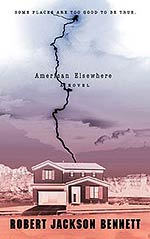
![]() charlesdee
charlesdee
3/17/2013
![]()
When her alcoholic father dies, ex-cop Mona Bright discovers that part of her inheritance is a house once owned by her mother in the town of Wink, New Mexico. Mona's mother committed suicide, and Mona has all the unresolved issues that history provides. She wants to see the house, if for no other reason than to sell it, but she cannot find Wink on the map or any evidence that the town exists. When she does discover it, it is "picture postcard pefect." In other words, it is too good to be true, creepy as hell the closer she looks, and apparently a gateway between our world and an elsewhere that has so taken over Wink that the moon shines pink and the smart people don't leave home after dark.
Bennett's set up makes room for a narrative that is part detective story, part science fiction, and part Lovecraftian, multi-dimensional horror tale. (Yes, there will be tentacles.) The straight SF elements revolve around the ruins of Coleman laboraties, where Mona's mother was an important researcher. This was one of those facilities that comes straight out of 1950's SF, although the author is so young he has to set the activities at Coleman in the 1980's Big science takes place here, and of course it has had catastrophically unexpected consequences. Enter the tentacles. Creatures from another dimension have settled in Wink, preserving it as an eerie, pristine time capsule of what they found on their arrival. In another realm they were beleaguered gods. Here some inhabit human bodies while other exist as much less presentable creatures in canyons, caves, and the mesa outside the city.
And of course everything is beginning to fall apart. Mona's arrival coincides with the supposedly impossible murder of one of their kind. Complications and weirdness build to such a degree that the book often has to slow down for a whole lot of explaining to take place. Bennett is usually good at embedding these info-dumps in narrative, and a scene involving Gene Kelly in An American in Paris is one of his great set pieces.
I would have enjoyed all this much more than I did if it had wound itself up a good 200 or more pages sooner. But looking at other reader reviews, the length does not seem a deterrent to other's embrace of the novel. I was ready for things to be over to such a degree that it took a while, during the last hundred pages or so, for me to absorb the genuine pathos and anguish that Bennett successfully conveys, both among the humans and the pandimensional squiddy things.
http://www.potatoweather.blogspot.com